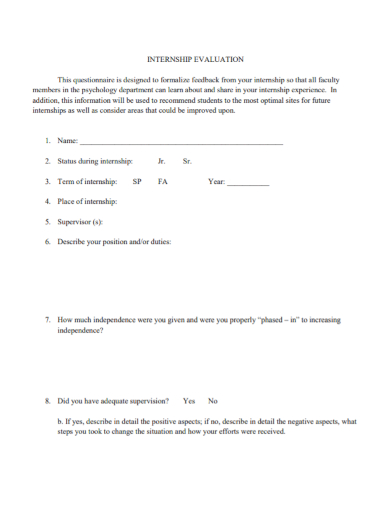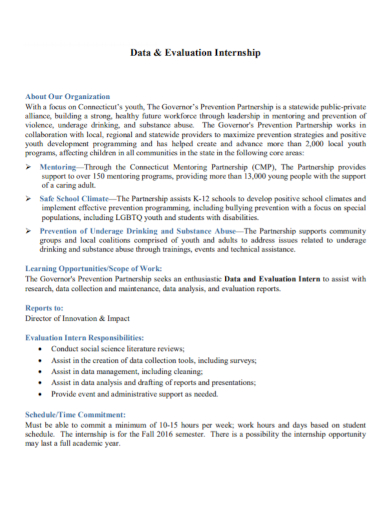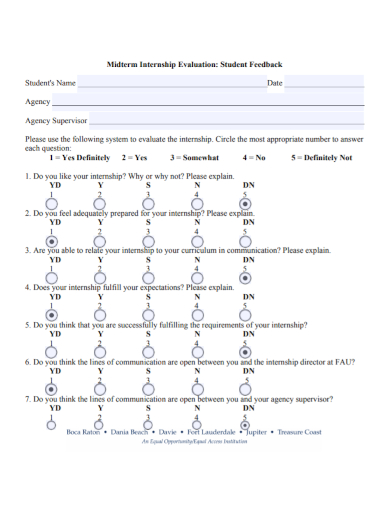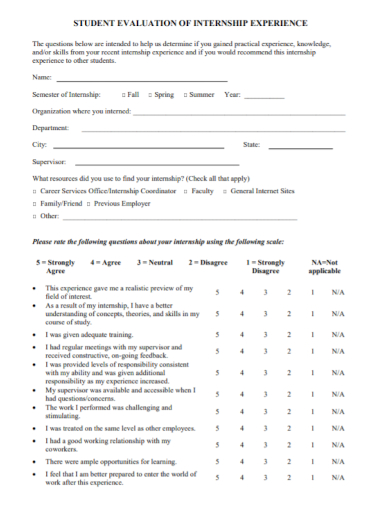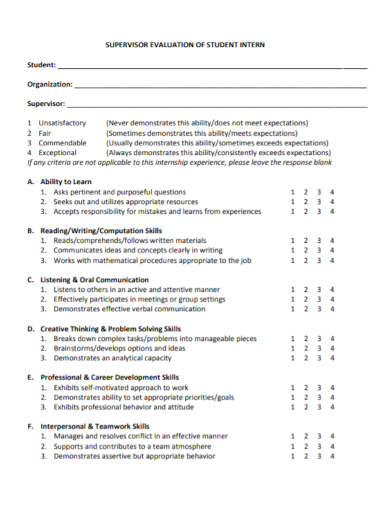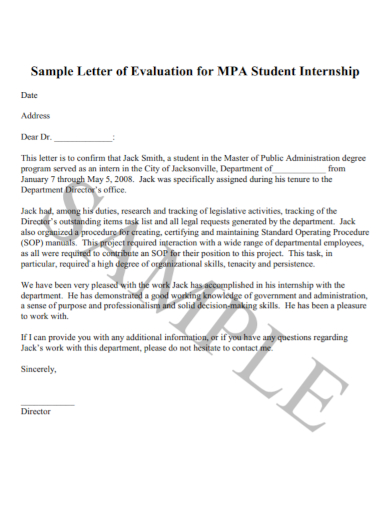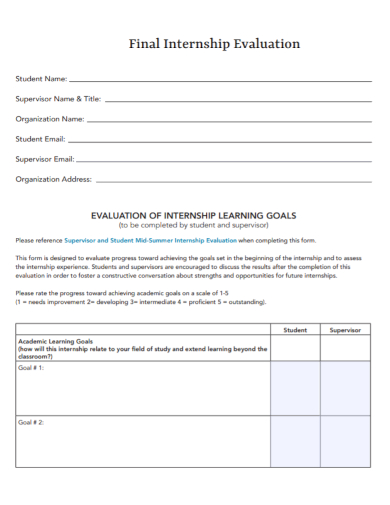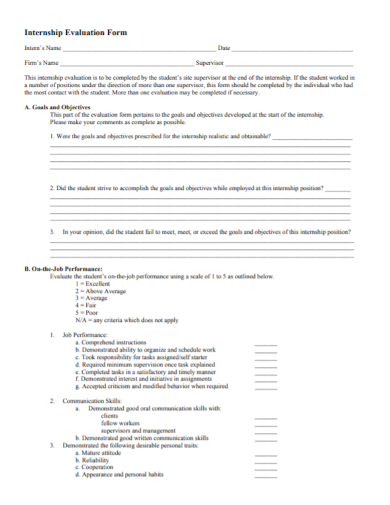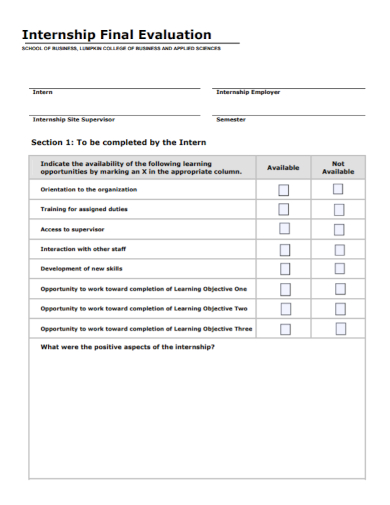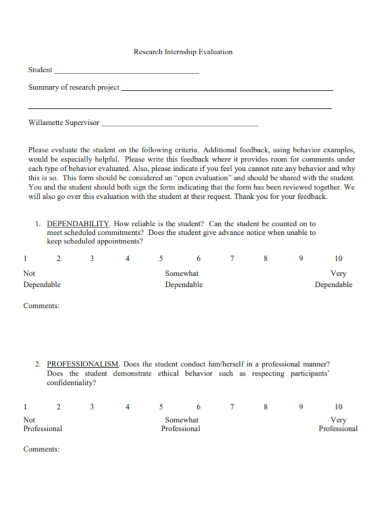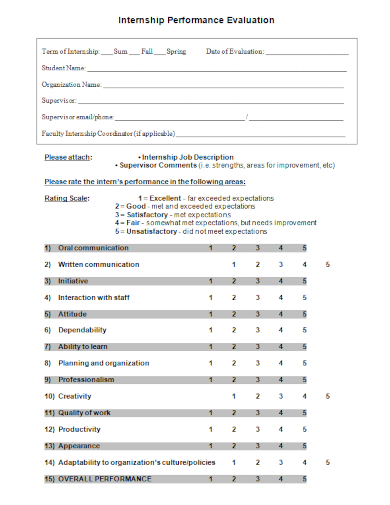10+ Internship Evaluation Samples
A professional learning experience that provides meaningful, practical work relating to a student’s degree or field of career interest is known as an internship. Interns assist the organization with tasks assigned by various teams, such as research, data collection, and working closely with other team members to gain a better understanding of the company. In the last remaining days of your internship, the supervisor will have to assess and give feedback on your work and contribution for the company. At the same time, the intern will also have to recall their own experience and learnings as well, in order evaluate if you were properly guided and taught. In this article, we provide you with free and ready-to-use samples of Internship Evaluations that you could use– for interns and supervisors alike– for your convenience. Keep on reading to find out more!
1. Internship Evaluation
2. Internship Evaluation Scope of Work
3. Student Internship Feedback Evaluation
4. Student Internship Evaluation
5. Supervisor Student Internship Evaluation
6. Student Internship Evaluation Letter
7. Final Internship Evaluation
8. Internship Evaluation Form
9. Internship Final Evaluation
10. Research Internship Evaluation
11. Internship Performance Evaluation
What Is an Internship Evaluation?
Evaluation is a tool for determining how well an internship program fulfills its objectives. Evaluations assist in determining what works well with the intern and what aspects of the program should be improved. This assessment will be critical in judging the worth of your internship experience for both you and future student interns. It acts as a built-in monitor within the software, allowing you to check on your learning progress at any moment. It also provides helpful comments on the internship program’s design and implementation.
How to Make an Internship Evaluation
Internships are a learning experience, it’s critical to assess the skills you’ve gained during your time there. Not all organizations require an internship evaluation, but it is a useful tool to improve the program for future interns while also assessing your learning experience. The internship evaluation form would vary from company to company, but here are the following general information you should consider as you write one of your own:
1. Include necessary information.
You should indicate your name, internship term, company name, your supervisor’s name, and the like. The body of your internship report will be devoted to your interactions with the company. It’s a good idea to clarify your position and responsibilities as an intern with the organization before going into detail about your experience and the lessons you learnt. Doing so will give your reader a more complete overview of your internship and allow you to discuss your accomplishments in the role.
2. Talk about what you’ve learned and the abilities you’ve gained.
Tell them you’ll be grading their work according to professional standards, but that it will be evaluated several times. You will detail the precise items you learned and the abilities you developed in the major section of your internship report. Relate these abilities to your educational background. Describe unique experiences you had while working for the company that helped you grow.
3. Complete the provided rating score.
In most internship evaluation forms, there will be a numerical rating provided as well. You should be honest with how you score each category. If there are questions provided, you should also be specific with your comments and answers.
4. Finish with some thoughts that are still on your mind.
This method gives you insight into items you’d like to work on in the future, as well as suggestions for how the organization’s internship program could be improved. Keep in mind that other people, including your internship supervisor and other corporate management, may view your internship report. Maintain a professional communication style and edit your report thoroughly before submitting it.
FAQ
What are the advantages of internships for students?
An internship allows you to learn by doing in a context where you are supervised by a working professional and have the freedom to pursue your own learning objectives without the duties of a full-time employee.
What are the drawbacks of an internship?
An internship could be financially draining if you’re used to getting paid or if you have rising student loan debt. Some employers or supervisors exploit interns by assigning them monotonous tasks that does not allow them to develop new skills. Interns can be perceived as temporary labor, which is the last thing you want to be associated with.
When is the best time to submit an internship application?
As a general rule, applying for internships as early as six months before the start date is a good idea. Don’t panic if you’re late in the process; many internships, particularly unpaid ones, can be scheduled as late as a month before the summer or semester you want.
Your internship, whether paid or unpaid, is a great learning experience that boosts your skills and widens your network of connections. You should take it seriously. Download our easily customizable and printable free samples of Internship Evaluations today!
Related Posts
FREE 10+ Recommendation Report Samples
FREE 10+ Executive Summary Report Samples
FREE 10+ Acknowledgement for Internship Report Samples
FREE 9+ Sample Candidate Evaluation Forms
FREE 8+ Sample Job Evaluation Reports
FREE 6+ Supervisor Evaluation Samples
FREE 6+ Sample Letter of Recommendation for Internship
Dos in Writing Your Self-Evaluation
FREE 3+ School Counselor Daily Log Samples
FREE 49+ Sample Reports
FREE 36+ Report Templates
FREE 29+ Sample Reports
FREE 10+ Student Teaching Agreement Samples
FREE 10+ Sports Report Samples
FREE 10+ General Intern Job Description Samples

